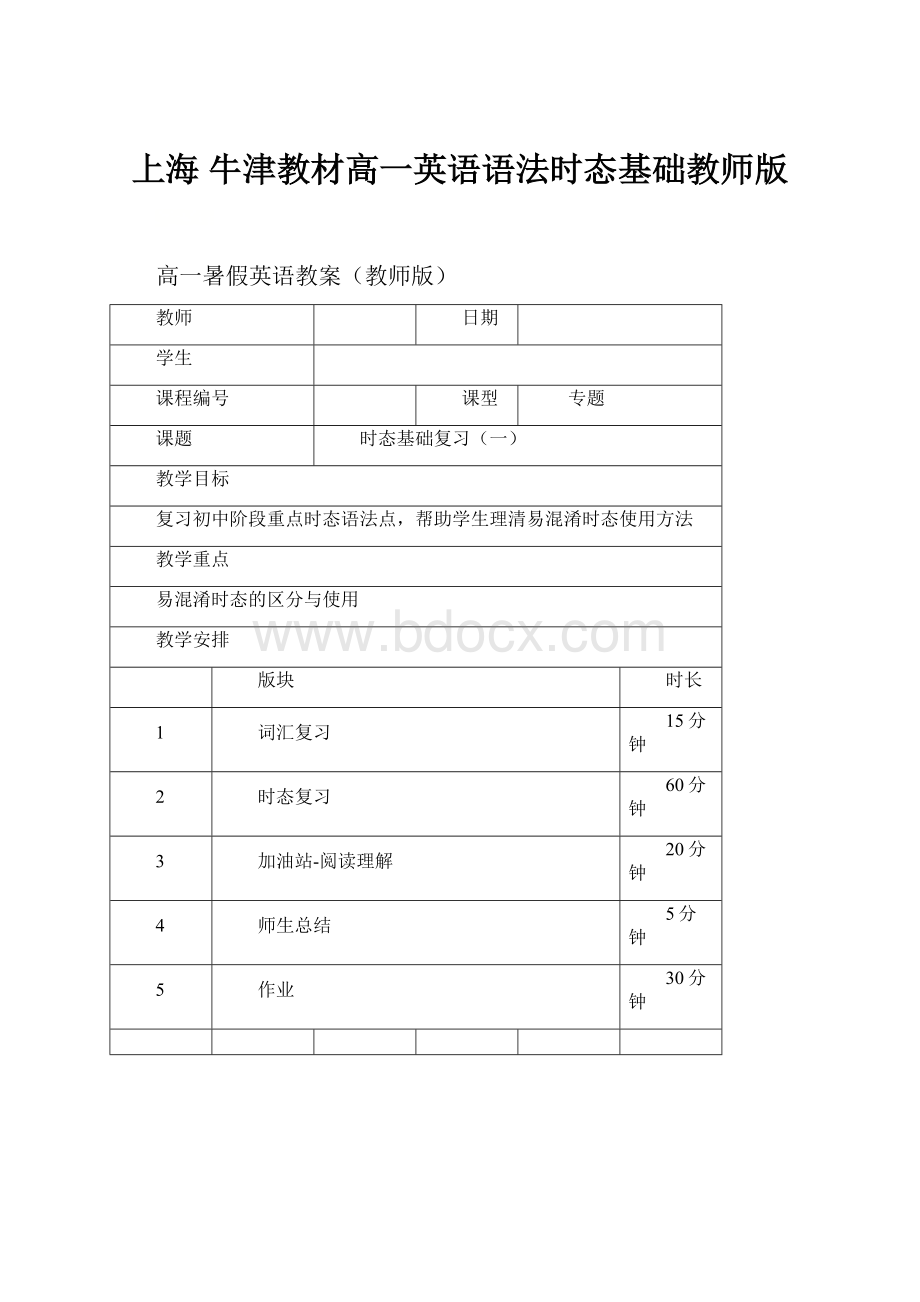上海 牛津教材高一英语语法时态基础教师版.docx
《上海 牛津教材高一英语语法时态基础教师版.docx》由会员分享,可在线阅读,更多相关《上海 牛津教材高一英语语法时态基础教师版.docx(29页珍藏版)》请在冰豆网上搜索。

上海牛津教材高一英语语法时态基础教师版
高一暑假英语教案(教师版)
教师
日期
学生
课程编号
课型
专题
课题
时态基础复习
(一)
教学目标
复习初中阶段重点时态语法点,帮助学生理清易混淆时态使用方法
教学重点
易混淆时态的区分与使用
教学安排
版块
时长
1
词汇复习
15分钟
2
时态复习
60分钟
3
加油站-阅读理解
20分钟
4
师生总结
5分钟
5
作业
30分钟
词汇复习
、
1.ability[ə'bɪlɪtɪ]n.能力;才能
Thepublicneverhadfaithinhisabilitytohandlethejob.
公众才来都不相信他有处理这个工作的能力。
theabilityforsth,theabilityindoingsth.做某事的能力
Ø同义词:
capacityn. 能力;才能
Theyhavetheabilitytodestroytheenemytodefeattheopponents.
他们有能力打败对手。
Øabilityn.→ableadj.beabletodosth.
→enablev.enablesb.todosth.
capacityn.→capableadj.becapableofdoingsth.
2.accept[ə'ksept]vt&vi.接受
Shehadnochoicebuttoaccepttheofferofmarriagefromastranger.
她别无选择,只能接受一个陌生人的求婚。
同义词:
receivevt.&vi.收到
Shereceivedabirthdaypresentfromaboybutdidnotacceptit.
她收到一个男孩送的生日礼物,但没有接受。
Øacceptable可接受的
Øacceptancen.接受
3.active['æktɪv]adj.积极地;活跃的
IamanactivememberoftheConservativeParty.
我是保守党的积极分子。
takeanactivepartin积极参加
activityn.活动
indooractivities室内活动;outdooractivities室外活动;sportsactivities体育活动
Øactivea.主动的
Weshouldplayanactiveroleinpolitics.我们应该在政治生活中扮演积极主动的角色。
Øactivatev.使活动,启动,激活
Youcanpressthatbuttontoactivateyourcomputer.
你可以按下那个按钮来启动你的电脑。
Nicotineincigarettesmokeactivatessmallbloodthatincreasethelikelihoodofbloodblots,therebyaffectingbloodcirculationthroughoutthebody.香烟中的尼古丁会激活小的血细胞,这些血细胞增加了血栓的可能性,从而影响体内的血液循环。
4.afraid[ə'freɪd]adj.害怕的;担心的
Don'tbeafraidtogiveupthegoodtogoforthegreat.
为了追求卓越,别害怕放弃优秀。
Ø同义词:
frightenedadj.害怕的;受惊的;受恐吓的
Themenweretryingtoharassthefrightenedrefugees.
这些人企图骚扰那些吓坏了的难民。
5.aged['eɪdʒɪd]adj.年老的
Thegovernmentisconsideringsettingupmorehomesfortheaged.
政府正在建立更多的的养老院。
Mr.Wanghastwochildrenaged10to12.王先生有两个孩子,分别是十岁和十二岁。
Ø同义词:
senioradj.年长的
Manyseniorcitizenshavebeenthroughtwoworldwars.
很多年长的公民都经历了两次世界大战。
6.agree[ə'griː]v.同意;应允
Realistswouldagreewithmanyofthesecriticisms.
现实主义者可能会赞同许多这类批评
agreewithsb./sth.同意某人/赞成某事
Iagreewitheverywordyou’vejustsaid.我同意你刚刚说的每一个字。
agreetosth.同意某事Doyouagreetotheconditions?
你同意这些条件吗?
agreeabout/onsth.就……达成一致Theyhaveagreedonthetermsofcooperation.
他们就合作达成了协议。
Øagreev.→agreeableadj.adj.令人愉快的;适合的;和蔼可亲的
This,togetherwithitsmultiracialsociety,informallifestyleandagreeableclimate,lureforeignerstoitsshores.
这一点,加上这里的多元种族社会、不拘礼仪的生活方式,宜人的气候,使得外国人才近悦远来。
Ø同义词:
approvevt.批准;赞成;为…提供证据
Herparentsdidnotapproveofherdecision.
父母不赞成她的决定。
7.allow[ə'laʊ]v.允许
ThechildrenareallowedtowatchTVafterschool.
孩子们得到允许在放学后看电视。
Øallowdoing允许做某事
Wedonotallowsmokinginpublic.公共场所不允许吸烟。
Ø同义词:
permitvt.承认;准许进入;可容纳
Theguardspermittedmetobringmycameraandtaperecorder.
Øpermitdoing允许做某事
Themanagerdoespermiteatinglunchafter1o’clockintheafternoon.
8.alone[ə'ləʊn]adj.&adv.单独的;单独地
Youaloneshoulddeterminewhatisrightforyou.
只有你自己才能决定什么适合你。
livealone独居,leavesb.alone不打扰某人;leavesth.alone不碰某物
Ø同义词:
isolatedadj.孤立的;分离的;单独的
Manyoftherefugeevillagesareinisolatedareas.
很多难民村落都在偏远地区。
9.ambition[æm'bɪʃ(ə)n]n.野心,雄心;抱负,志向
Hisambitionistosailaroundtheworld.
他的理想是航行环游世界。
Øambitious雄心勃勃的,胸怀大志的
Theywereambitiousfortheirchildren.他们对自己的孩子有着很高的期望。
Ø同义词:
enterprisen.事业心,进取心
thespiritofenterpriseworthyofafreeandindustriouspeople
自由勤劳的民族具有的进取精神
10.amount[ə'maʊnt]n.数量;总额,总数
Istilldoacertainamountofworkforthem.
我仍旧为他们做一定数量的工作。
ahugeamountof(+不可数名词)大量的;alargenumberof(+可数名词复数)大量的
ØConsumerspendingonsports-relateditemsamountedto$9.75billion.
消费者在体育相关用品上的消费总共达到了97.5亿美元。
Ø同义词:
quantityn.量,数量; 定量,大批
Thelessdiscerningdrinkerwhoprefersquantitytoquality
不求质、但求量的不那么识货的饮酒者。
小试牛刀
Ⅰ.选词填空
aloneallowapproveseniors
activecapableacceptafraid
1.Hewasdescribedbyhisasamodelofficer.
2.Irealizedhowpossibleitwastoovercomeyourlimitations,toachievewellbeyondwhatyoubelieveyourselfof.
3.Whencompetingwithothers,youshouldalwaysrememberthatdonottheopponentsabreathingspell.
4.amongthemajorcandidates,Gaviriaexpressedadeterminationtocontinuethecampaigntodefeatthedrugscartels.
5.Companiesneedtotakestepstoincreaseexports.
6.Don'tbetoconsiderapparentlyextravagantideas.
7.Weadvisednewspapersnottotheadvertising.
8.Publicopinionpollsshowlessthanone-thirdofAmericansofthewaythepresidentisdoinghisjob.
Ⅱ.翻译
1.他知道Soli是想吓唬他,所以他挤出笑容掩饰自己的恐惧。
(frighten)
2.我还得设法把信心传递给女儿,帮她忍受降临在我们身上的事情。
(endure)
3.我同意你的观点,开放的系统是目前最好的。
(agree)
4.即使当我年轻的时候我也从未有过什么雄心。
(ambition)
5.教师不仅要教授知识,还要教会学生们自学的能力。
(ability)
难度:
☆☆☆
【Keys】:
Ⅰ.1.seniors2.capable3.allow4.Alone5.active6.afraid7.accept8.approve
Ⅱ.1.HeknewthatSoliwastryingtofrightenhim,sohesmiledtohidehisfear.
2.SomehowIalsohadtoconveyconfidencetomydaughter,tohelpherendurewhathadbefallenus.
3.Iagreewithyouthattheopensystemisbyfarthebest.
4.EvenwhenIwasyoungIneverhadanyambition.
5.Teachersdonotonlyteacherknowledgetostudents,butalsotheabilitytolearnbythemselves.
专题复习
Ⅰ.初中时态概况
名称
用 法
动词形式(以do为例)
常用时间状语
例 句
一
般
现
在
时
1.现在的状态
2.经常性或习惯性的动作
3.主语具备的性格或能力
I/We/You/Theydo...
He/She/Itdoes...
inthemorning/afternoon/
morning
everyday/morning/Sunday
onSunay
always usually often
sometimes
1.Sheistwelve.
2.Igetupat6:
30everyday.
3.Shelikesswimming.
一
般
过
去
时
1.过去某时发生的动作或存在的状态
2.过去经常或反复发生的动作
I/Wedid...
Youdid...
He/She/Itdid...
Theydid...
yesterday(morning/afternoon)
lastnight/Sunday in1990
twodaysago always
usuallyoftensometimes
1.Igotupat6:
30yesterday.
2.Healwayswenttoworkbybuslastyear.
一
般
将
来
时
1.将来某时间要发生的动或存在的状态
2.将来经常或反复发生的
动作
Ishalldo...
I’mgoingtodo...
We/You/They/He/She/Itwilldo...
We/You/Theyaregoing
todo...
He/She/Itisgoingto
do...
tomorrow(morning/afternoon/
evening)
nextyear/month/week
1.Iwillgotomyhometownnextweek.
2.I’llcometoseeyoueverySunday.
3.I’mgoingtoswimtomorrowafternoon.
现
在
进
行
时
现在或当前一段时间内正在进行或发生的动作
I’mdoing...
He/She/Itisdoing...
We/You/Theyaredoing
...
now
1.Sheiswateringtheflowers.
2.Aretheyworkingnow?
3.Theyarelisteningtotheteacher.
过
去
进
行
时
过去某一时刻或某一段正在进行的动作
I/He/She/Itwasdoing
...
We/You/Theyweredoing
....
thistimeyesterday
atteno’clockyesterday
atthattime
whenhecameback
1.Wewerereadinginclassthistimeyesterday
2.Iwasdrawingapicturewhentheteacher
camein.
现
在
完
成
时
1.过去发生或已经完成的某一动作对现在造成的影响或结果
2.表示过去已经开始并持续到现在的动作或状态
He/She/Ithasdone...
We/You/Theyhavedone
...
already just before never
forthreeyears
since1990
thismorning
thesedays
1.I’vealreadypostedtheletter.
2.Wehaveknowneachotherfortenyears.
3.Theylivedheresince1997.
4.HaveyoueverbeentoBeijing?
过
去
完
成
时
过去某一时间前已经发后的动作或状态
I/We/You/He/She/Ithaddone…….
bytheendof…
when+一般过去时
before+一般过去时
1.Ihadlearned2000wordsbytheendoflast term.
2.WhenIgotout,thebushadalreadyleft.
Ⅱ.深入了解
一般现在时
通常用“usually,often,everyday,sometimes”。
一般现在时基本用法介绍
1.一般现在时的功能
1).表示事物或人物的特征、状态。
如:
Theskyisblue.天空是蓝色的。
2).表示经常性或习惯性的动作。
如:
Igetupatsixeveryday.我每天六点起床。
3).表示客观现实。
如:
Theearthgoesaroundthesun.地球绕着太阳转。
2.一般现在时的构成:
●肯定句
1)主语+系动词be(is,am,are)+名词(形容词,介词短语)
2)其他主语+动词原形+其它
第三人称单数+动词-s+其它
如:
Iamaboy.我是一个男孩。
WestudyEnglish.我们学习英语。
MarylikesChinese.玛丽喜欢汉语。
●否定句
1)主语+be(is,am,are)+not+其它。
如:
Heisnotaworker.他不是工人。
2)其他主语+donot(don’t)动词原形+其它 Idon’tlikebread
第三人称单数+doesnot(doesn’t)动词原形+其它Hedoesn’toftenplay.
●一般疑问句:
1)Be(Is,Are)+主语+其它?
如:
-Areyouastudent?
-Yes.Iam./No,I’mnot.
2)Do其他主语+动词原形+其它?
Does+第三人称单数+动词原形+其它+?
注意:
遇I/we—you,my—your,some—any.
Doesshegotoworkbybike?
-Yes,shedoes./No,shedoesn’t.
Doyouoftenplayfootball?
-Yes,Ido./No,Idon’t.
●特殊疑问句
疑问词+一般疑问句。
如:
Whereismybike?
Howdoesyourfathergotowork?
现在进行时
通常用“now/look/listen”.
现在进行时表示现在正在进行或发生的动作,也可表示当前一段时间内的活动或现阶段正在进行的动作。
1、现在进行时的构成
●肯定句
主语+be(is,am,are)+动词现在分词-ing
eg:
Iam(not)doingmyhomework.
You/We/Theyare(not)reading.
He/She/Itis(not)eating.
●否定句
主语+be(is,am,are)+not+动词现在分词-ing
●一般疑问句
Is(Are)+主语+动词现在分词-ing?
●特殊疑问
疑问词+be+主语+动词ing?
2、动词加ing的变化规则
1)一般情况下,直接加ing,如:
cook-cooking
2)以不发音的e结尾,去e加ing,如:
make-making,taste-tasting
3)如果末尾是一个元音字母和一个辅音字母,双写末尾的辅音字母,再加ing,
如:
run-running,stop-stopping,swim—swimming
一般过去时
一般过去时通常用“amomentago,justnow,yesterday,last…”等。
一般过去时表示过去某个时间发生的动作或存在的状态,常和表示过去的时间状语连用。
一般过去时也表示过去经常或反复发生的动作感谢。
1、Be动词在一般过去时中的变化:
1)am和is在一般过去时中变为was。
(wasnot=wasn’t)
2)are在一般过去时中变为were。
(werenot=weren’t)
3)带有was或were的句子,其否定、疑问的变化和is,am,are一样,即否定句在was或were后加not,一般疑问句把was或were调到句首。
2、行为动词的一般过去时变化
肯定句(Positive)
动词过去式
Iwentshoppinglastnight.
否定句(Negative)
didn’t+动词原形
Ididn’tgoshoppinglastnight.
一般疑问句(Yes/No)
Did…+动词原形…?
Didyougoshoppinglastnight?
特殊疑问句(wh-)
Whatdid…+动词原形…?
Whatdidyoudolastnight?
3、动词过去式的变化
规则动词的变化规则
一般动词
+ed
planted,watered,climbed
以不发音的e结尾
+d
liked
辅音字母加y结尾
-y+ied
study—studied,cry-cried
重读闭音节单词,末尾只有一个辅音字母
双写最后一个字母+ed
stop–stopped
plan-planned
不规则动词的变化:
原形
过去式
原形
过去式
原形
过去式
原形
过去式
sweep
swept
teach
taught
have
had
go
went
keep
kept
think
thought
do
did
find
found
sleep
slept
buy
bought
eat
ate
say
said
feel
felt
drink
drank
is/am
was
take
took
read
read
give
gave
are
were
mean